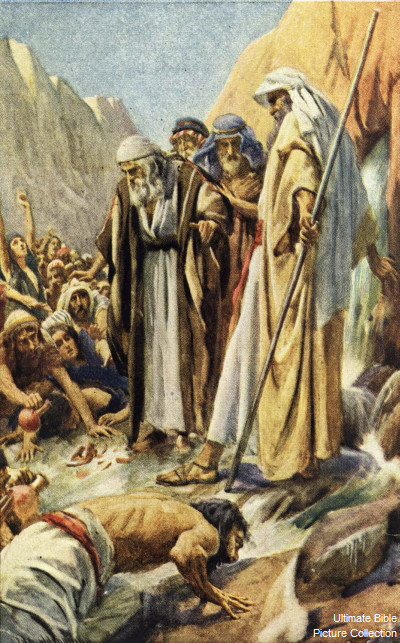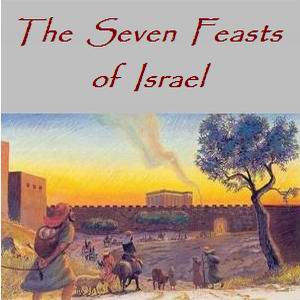 The narrative skips over the next 37 years of wandering in the wilderness to the beginning of the last year before the Israelites would enter the Promised Land. This is where chapter 20 picks up the story.
The narrative skips over the next 37 years of wandering in the wilderness to the beginning of the last year before the Israelites would enter the Promised Land. This is where chapter 20 picks up the story.
In verse 1, we learn that after wandering for almost 38 years, the Israelites have returned to Kadesh, the region south of the Promised Land where the older generation had refused to enter. The author notes that Miriam, the older sister of Moses and Aaron, dies after their arrival. Miriam’s death is notable because she is not only the most important woman in Israel at that time, but she symbolizes the older generation that was dying off before the younger generation could take possession of Canaan.
In verses 2-5, the younger generation repeats the rebellious pattern established by their parents. They complain that Moses and Aaron have brought them out of Egypt to die, and that there is no water or food for them to eat.
God instructs Moses to take the staff of Aaron out of the tabernacle, assemble the leadership of Israel, and speak to a particular rock. Out of the rock water will flow so that the people of Israel and their livestock can drink.
Moses grabs the staff, gathers the assembly of Israel in front of the rock, and then disobeys God’s command. Instead of speaking to the rock so that God could cause water to flow out of it, Moses loses his temper, reprimands the assembly, and then strikes the rock twice with his staff. Because of Moses and Aaron’s actions at the rock, God bans both of them from entering the Promised Land, just like the rest of the older generation. Only Joshua and Caleb, from that generation, would now see the Promised Land.
Why did God punish Moses and Aaron for what happened at the rock? Moses and Aaron had been frustrated with the people of Israel before, but this time was different. R. Dennis Cole explains what might have been going on:
This time the fullness of [Moses’] frustration was manifest before God and the whole assembled congregation. Moses did not simply call the people rebels, a mere statement of truth (though perhaps out of anger), but he took the Lord’s instructions and used them as a means to justify his self-interest and self-pity. The Lord had said that Moses and Aaron would be the agents for the delivery of the water from the rock, but then the prophet’s self-centered attitude erupted as he usurped the words of God for his own glorification, saying, ‘Shall we bring forth from this rock for you water?’ Such presumption would have the general effect, notes Budd, that ‘they have prevented the full power and might of Yahweh from becoming evident to the people, and have thus robbed him of the fear and reverence due to him.’
Moses struck the rock not once but twice as he vented his anger and frustration over this ever-rebellious lot. As in previous circumstances of this kind, the rock was a symbol of God’s mercy and benevolence, so striking the rock was in a sense a striking out against God. Moses had damaged severely the intimate personal relationship he had with God. His actions were detrimental to the maintaining of a reverence for God and his mercy in Israel. The trusted servant had fallen into the same trap as the many rebellious people he had complained about to God. Harrison calls Moses’ actions ‘an unpardonable act of insubordination.’
Not only did Moses and Aaron disrespect God in front of Israel, they tried to claim that it was through their striking the rock that water would flow. They had acted like pagan magicians performing an incantation instead of acting as the representatives of the one true God of the universe.
God himself tells Moses and Aaron why they were being punished. “Because you did not trust in me enough to honor me as holy in the sight of the Israelites, you will not bring this community into the land I give them.” Moses and Aaron did not trust God. They lacked faith, and thus they were punished in the same way that the unbelieving older generation was punished: they would not enter the Promised Land.
After this incident, the people of Israel try to make their way directly north to the plains of Moab, directly across the Jordan River from the town of Jericho. This is where they would enter the Promised Land. But, in order to go directly north they would have to go through the land of Edom.
Verses 14-21 recount a diplomatic exchange between Israel and Edom, where Israel twice asks for safe passage through Edom using a north-south road called the king’s highway. Edom twice refuses and then sends a large army to meet the Israelites and prevent them from entering Edom’s lands.
What is especially sad about this incident is that the people of Edom are descended from Esau, the twin brother of Jacob. Moses appeals to Edom as the brother of Israel (Jacob), and reminds Edom of the trials and tribulations of Israel in Egypt. The descendants of Esau, however, show no mercy. Since the land of Edom was not part of the Promised Land, the Israelites refused to fight, and instead would head south to go around Edom.
The final eight verses of chapter 20 close with the death of the first high priest of Israel, Aaron. God reminds Moses and Aaron that they will not enter the Promised Land because of their rebellion. Moses is to climb atop Mount Hor with Aaron and his eldest son, Eleazar. There Moses removed the priestly garments from Aaron and placed them on his son, thus transferring the role of high priest to Eleazar. Aaron died on Mount Hor and the people of Israel mourned his death for 30 days.
The death of Aaron was indeed a blow to the nation of Israel. It must have been difficult for his brother and son to bury him. R. Dennis Cole reminds us of the highlights (both good and bad) of Aaron’s life:
The date of his death and his age (123 years) as recounted in the journey itinerary in Num 33:38 coincide with the data given in Exod 7:7, which states that Moses was eighty years of age and Aaron eighty-three when they first spoke to the pharaoh in Egypt. The first high priest of Israel was an enigmatic figure in the Old Testament. On one hand he functioned as a spokesman for Moses before the pharaoh (Exod 4:14; 5:2–3; 7:6, 10); at the command of the Lord through Moses he held out his hand over the Nile River and a swarm of frogs emerged (Exod 8:5–9); he stretched out his rod and the dust turned to lice throughout the land (Exod 8:16–17). Later during the judgment against the rebellious gang led by the Levite Korah, Aaron literally stood wielding his censer between the living and the dead, acting as their exemplary mediator (Num 16:48; Heb 17:13).
On the other hand he succumbed to the whims of the people in the production of the golden calf, which led to idolatrous worship and eventual judgment (Exod 32:1–35), and he followed Moses’ example in the rebellion at the Waters of Meribah (Num 20:10).
In the Book of Hebrews, Aaron serves as a prototype of the high priesthood of Jesus Christ, though his priesthood was deemed inferior to that of the Melchizedek typology that was applied to Jesus (Heb 7:1–9:28). . . . Aaron supervised an earthly priesthood and cult that was but a mere shadow of things to come, in which the sacrifice of animals and plants symbolized the rendering of the life of the offerer when the life of the element was presented to God.
Out of the three siblings (Moses, Miriam, and Aaron) that had been together in the wilderness for 40 years, only Moses remains, and his time is short. The torch would soon be passed on to the next generation.
 Proponents of the various versions of the Documentary Hypothesis believe there must be 4 or more authors of the Pentateuch for several reasons, but the three most common are:
Proponents of the various versions of the Documentary Hypothesis believe there must be 4 or more authors of the Pentateuch for several reasons, but the three most common are: The Israelites are now wandering in the wilderness for 38 years because of their refusal to take possession of the Promised Land. The events of chapters 16 and 17 take place some time during this time period, but the author does not tell us exactly when.
The Israelites are now wandering in the wilderness for 38 years because of their refusal to take possession of the Promised Land. The events of chapters 16 and 17 take place some time during this time period, but the author does not tell us exactly when. Since leaving Mount Sinai, the Israelites have traveled a few months toward the land of Canaan, or the Promised Land. They’ve arrived at the southern border of the Promised Land and are camped there. Verses 1-3 of chapter 13 indicate that God commands Moses to send out 12 representatives of each tribe of Israel to explore the land before the whole of Israel makes its way into the land.
Since leaving Mount Sinai, the Israelites have traveled a few months toward the land of Canaan, or the Promised Land. They’ve arrived at the southern border of the Promised Land and are camped there. Verses 1-3 of chapter 13 indicate that God commands Moses to send out 12 representatives of each tribe of Israel to explore the land before the whole of Israel makes its way into the land. The Bible describes the place-names and geography of the route that Israel took from Egypt to the plains of Moab, across from the city of Jericho, during the 40 years in the wilderness. So why is it that archaeologists and biblical scholars cannot agree on the exact route that was taken?
The Bible describes the place-names and geography of the route that Israel took from Egypt to the plains of Moab, across from the city of Jericho, during the 40 years in the wilderness. So why is it that archaeologists and biblical scholars cannot agree on the exact route that was taken? As we pick up in chapter 9 of Numbers, Moses reminds the reader of the presence of God in the cloud above the tabernacle. On the first day the tabernacle was completed (first day of the second year of the exodus, or 1445 BC), the cloud covered it (recall Exodus 40:34). Verses 15-23 in chapter 9 explain what the cloud meant for the Israelites.
As we pick up in chapter 9 of Numbers, Moses reminds the reader of the presence of God in the cloud above the tabernacle. On the first day the tabernacle was completed (first day of the second year of the exodus, or 1445 BC), the cloud covered it (recall Exodus 40:34). Verses 15-23 in chapter 9 explain what the cloud meant for the Israelites. In chapter 23 of Leviticus, God summons the Israelites to worship and to celebrate seven annual feasts he has appointed. Walter Kaiser and Duane Garrett, in the
In chapter 23 of Leviticus, God summons the Israelites to worship and to celebrate seven annual feasts he has appointed. Walter Kaiser and Duane Garrett, in the